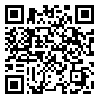BibTeX | RIS | EndNote | Medlars | ProCite | Reference Manager | RefWorks
Send citation to:
URL: http://mjiri.iums.ac.ir/article-1-2656-en.html
Background: Prostate cancer is one of the leading causes of cancer deaths among men. New gene expressed in prostate (NGEP), is a prostate-specific gene expressed only in normal prostate and prostate cancer tissue. Because of its selective expression in prostate cancer cell surface, NGEP is a potential immunotherapeutic target. To target the NGEP in prostate cancer, it is essential to investigate its expression in prostate cancer cells.
Methods : In the present study, we investigated NGEP expression in LNCaP and DU145 cells by real time and RT-PCR, flow cytometric and immunocytochemical analyses.
Results : Real time and RT-PCR analyses of NGEP expression showed that NGEP was expressed in the LNCaP cells but not in DU145 cells. The detection of NGEP protein by flow cytometric and immunocytochemistry analyses indicated that NGEP protein was weakly expressed only in LNCaP cell membrane.
Conclusion : Our results demonstrate that LNCaP cell line is more suitable than DU145 for NGEP expression studies however, its low-level expression is a limiting issue. NGEP expression may be increased by androgen supplementation of LNCaP cell culture medium.
| Rights and permissions | |
 |
This work is licensed under a Creative Commons Attribution-NonCommercial 4.0 International License. |





